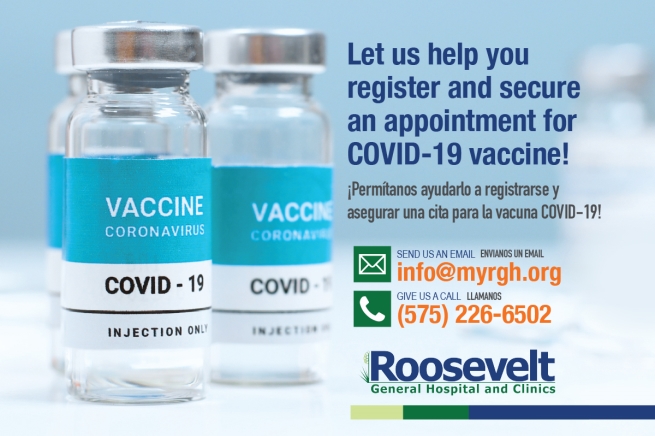Coronavirus (COVID-19)
This page offers information and resources for Roosevelt General Hospital & Clinic patients and the community, including steps to take if you are concerned you may have coronavirus. Currently, patients and visitors are not required to wear a face mask when visiting the hospital or clinic. However, we ask that you wear a face mask if you are unwell or have COVID-like symptoms for the safety of others. Face masks are available at the entrance of the hospital and clinic.
Resources
- Centers for Disease Control (CDC)
- New Mexico State Department of Health (NMDOH)
- State of New Mexico, Coronavirus Updates
COVID-19 Vaccine
Getting Vaccinated
Learn more about what to expect at your COVID-19 vaccination appointment and get helpful tips on how to reduce pain and discomfort from common side effects after getting a COVID-19 vaccine.
Vaccine Safety
Learn more about how CDC is ensuring the safety of COVID-19 vaccines in the United States.
Vaccine Registration
If you are interested in obtaining a COVID-19 vaccine, please contact RGH Clinic and schedule an appointment with your primary care provider. The first available appointment will be scheduled for you.
 |
Past Events Hosted by RGH
Drive-thru Flu Shot Event hosted by RGH in October 2020 Medical professionals administered 251 influenza vaccinations on Saturday, October 19. Due to the pandemic, the regularly scheduled health fair--were flu shots are given free to the public--was not hosted. Because flu shots are an important part of prevention, more than a dozen employees opted to volunteer to host the event and provide the community with their flu immunization. Thank you to everyone who supported this community event. Drive-thru COVID-19 Testing by RGH in May 2020 RGH tested 154 community members at the drive-thru COVID-19 testing event on Saturday, May 2 at ENMU Greyhound football stadium. The National Guard flew the specimens to the SLD lab via Blackhawk helicopter. There was only one confirmed positive test returned from the 154 tested. Thank you to everyone who supported this community event.Q & A
How can I get tested for COVID-19, Influenza or Strep?
- Visit the RGH Clinic during normal business hours or extended hours for testing of COVID-19 and other infectious diseases. You don't necessarily need an appointment, walk-ins are accepted; however, if the clinic becomes full you may be asked to make an appointment. Please bring a photo ID and your insurance card to register. Make sure to wear a face mask when entering the clinic or hospital.
When should I visit the Emergency Room?
- Reasons to seek emergency attention with COVID-19 are no different than reasons for going to an emergency department for other medical conditions: if you are having trouble breathing or significant shortness of breath, please seek medical attention. Remember, it is important that you contact the Emergency Department prior to visiting if you have symptoms or could be infected. This measure is specifically put in place to protect others from contracting the virus.
Is there a treatment for COVID-19?
- There is no specific treatment for COVID-19 and most cases will resolve on their own. In fact, 80% of cases are mild. Unless you have serious, emergent symptoms, you should not enter emergency departments. Entering medical facilities unnecessarily puts others at risk, increasing the potential to both infect others in the facility who would be more susceptible and reduce the facility’s ability to care for other patients.
Who is at the highest risk for COVID-19?
Some people are at higher risk for COVID-19 complications, including:
-
Older adults
-
Patients with chronic health conditions such as diabetes; lung, kidney or heart diseases; as well as patients who smoke
-
Patients with compromised immune systems, such as those undergoing chemotherapy or taking certain types of medications
-
Higher-risk patients who experience COVID-19 symptoms should contact their provider immediately
Patients who have appointments within the hospital or the clinic will also be asked screening questions about travel, fever and respiratory illness. Those who answer yes to those questions will be given a surgical mask to wear and may be isolated from the general waiting room.
What type of self-care can I do at home for mild symptoms?
- Stay home unless you need to leave for medical care
- Separate yourself from other people and animals in your home. Stay in a specific room and use a separate bathroom, if possible.
- Use a face mask, cover your cough and wash your hands frequently.
- For more information on self-care visit CDC
Prevention
The CDC recommends everyday preventive actions to help reduce the spread of this illness:- Get vaccinated
- Wear a face mask if you are not fully vaccinated or if you are feeling unwell
- Avoid close contact with people who are sick
- Wash your hands well and frequently—at least 20 seconds with soap and water or with hand sanitizer that is at least 60% alcohol
- Avoid touching your eyes, nose, and mouth with unwashed hands
- Cover cough/sneeze with a tissue, and then throw the tissue in the trash
- Clean/disinfect frequently touched objects and surfaces using a regular household cleaning spray or wipe
- Practice and abide by social distancing as governed by your state or city officials
Symptoms
- Fever
- Coughing
- Shortness of Breath or Difficulty Breathing
- Loss of taste or smell
- Chills
- Headache
- Body aches
- Nausea
- Diarrhea
|
|






